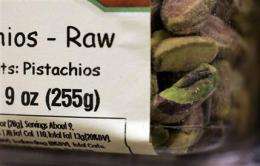Pistachio warning could signal food safety shift

(AP) -- It could take weeks before health officials know exactly which pistachio products may be tainted with salmonella, but they've already issued a sweeping warning to avoid eating the nuts or foods containing them.
The move appears to indicate a shift in how the government handles food safety issues - from waiting until contaminated foods surface one-by-one and risking that more people fall ill to jumping on the problem right away, even if the message is vague.
Officials wouldn't say if the approach was in response to any perceived mishandling of the massive peanut recall that started last year, only that they're trying to keep people from getting sick as new details surface about the California plant at the center of the pistachio scare.
"What's different here is that we are being very proactive and are putting out a broad message with the goal of trying to minimize the likelihood of consumer exposure," said Dr. David Acheson, FDA's assistant commissioner for food safety. "The only logical advice to consumers is to say 'OK consumers, put pistachios on hold while we work this out. We don't want you exposed, we don't want you getting salmonella.'"
Dr. Joshua Sharfstein, the president's new acting commissioner who started Monday, made it clear staff needed to move quickly, Acheson said.
The agency announced Monday that Setton Pistachio of Terra Bella Inc., the second-largest pistachio processor in the nation, recalled more than 2 million pounds of its roasted pistachios.
Suspect nuts were shipped as far away as Norway and Mexico, Acheson said Tuesday. One week after authorities first learned of the problem, they still had little idea what products were at risk, he said.
As federal health inspectors take swabs inside the plant to try to identify a salmonella source, a whole range of products from nut bars to ice cream and cake mixes remain in limbo on grocery shelves.
Company officials said Tuesday they suspected their roasted pistachios may have been contaminated by salmonella-tainted raw nuts they were processed with at the hulking facility.
Roasting is supposed to kill the bacteria in nuts. But problems can occur if the roasting is not done correctly or if roasted nuts are re-exposed to bacteria.
The firm sells its California-grown pistachios to giants of the food industry such as Kraft Foods Inc., as well as 36 wholesalers across the country.
"We care about our business and our customers greatly," said Lee Cohen, the production manager for Setton International Foods Inc., a sister company to Setton Pistachios. "We've never had an illness complaint before but obviously this affects the whole industry. It's not good."
California supplies 99.99 percent of the U.S. pistachio market, according to the California Pistachio Board.
"What's scary is that it's after the nuts have been processed that this stuff is getting into it, so it really makes you wonder," said Marcia Rowland, an avid pistachio eater in Apopka, Fla.
The FDA learned about the problem March 24, when Kraft notified the agency that routine product testing had detected salmonella in roasted pistachios. Kraft and the Georgia Nut Co. recalled their Back to Nature Nantucket Blend trail mix the next day and expanded the recall to include any Planters and Back to Nature products that contain pistachios Tuesday.
Kraft spokeswoman Laurie Guzzinati said her company's auditors visited the plant early last week, and "observed employee practices where raw and roasted nuts were not adequately segregated and that could explain the sporadic contamination."
She said she didn't know specifically what they saw.
Federal inspectors last visited the plant in 2003, and the California Department of Public Health was there last year, Acheson said. Federal officials made note of several problems - an open door into one of the nut rooms, and an employee wearing street clothes that weren't adequately covered - but nothing that posed a food safety threat, he said.
Acheson said management corrected the problems that day, and said he did not have access to California inspectors' records.
Cohen said the plant had never had an illness complaint, followed industry health guidelines and had its huge metal silos and warehouse inspected regularly, but refused to provide additional details or records. Several plaques on the firm's office walls showed the firm won industry awards for food safety excellence.
No illness have been tied to contaminated pistachios. Two people called the FDA complaining of gastrointestinal illness that could be associated with the nuts, but the link hasn't been confirmed, Acheson said.
While consumer advocates praised the government's swift action, they said the pistachio recall illustrated that more oversight was needed.
"It is encouraging that this response was so quick, but we need to move to a system that focuses on prevention through the entire food production process," said Jeff Levi, executive director of Trust for America's Health.
Two California legislators introduced a bill Tuesday that would require periodic testing of food at food processing facilities and mandate processors to report to state authorities within 24 hours any positive test result for a dangerous contaminant.
"We shouldn't be reacting to the next crisis, we should be preventing the next crisis," said Assemblyman Mike Feuer, D-Los Angeles.
---
On the Net:
Associated Press writers Tracie Cone in Fresno and Samantha Young in Sacramento contributed to this report.
©2009 The Associated Press. All rights reserved. This material may not be published, broadcast, rewritten or redistributed.

















